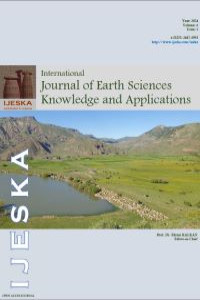Abstract
References
- Asibor, G., Ofuya, O., 2019. Surface water quality assessment of Warri metropolis using water quality index. International Letters of Natural Sciences 74 (1), 18-25.
- Bhardwaj, R., Gupta, A., Garg, J.K., 2017. Evaluation of heavy metal contamination using environmetrics and indexing approach for River Yamuna, Delhi stretch, India. Water Science Journal 31 (1), 52-66.
- Burke, K.C., Dewey, J.F., 1972. Orogeny in Africa: Dessauvagie T.F.J. Whiteman A.J. (eds.), Africa geology. University of Ibadan Press, Ibadan, 583- 608.
- Ibiam, N.A., Nwajei, G.E., Agbaire, P.O., 2017. Distribution of trace elements in surface water and sediments from Warri River in Warri, Delta State of Nigeria. World News of Natural Science 11 (4), 65-82.
- Kogbe, C.A., 1989. Geology of Nigeria. Rock View (Nigeria) Limited, Jos, 325-334.
- Mbuligwe, S.E., Kaseva, M.E., 2005. Pollution and self-cleansing of an urban river in a developing country: A case study in Dar es Salaam, Tanzania. Environmental Management Journal 36 (2), 328-342.
- Odokuma-Alonge, O., Chibuzor, N.S., Andre-Obayanju, O., 2019. Investigation of groundwater quality in Oluku/Otofure areas, Southern Nigeria. Journal of the Nigerian Association of Mathematical Physics 50, 235-240.
- Odokuma-Alonge, O., Edegbai, A.J., Andre-Obayanju, O., 2015. Water quality assessment of some hand-dug wells in Warri, Delta State. Journal of the Nigerian Association of Mathematical Physics 29, 391-396.
- Olomukuro, J., Iheukwumere, M.C., Anani, A., 2022. Assessment of physico-chemical characteristics of surface water and sediment with benthic macroinvertebrate communities around selected flow stations; Otumara, Saghara and Escravos, Delta State. Proceedings of ECOSON-IBADAN 2022.
- Reijers, T.J.A., 2011. Stratigraphy and sedimentology of the Niger Delta. Geologos 17 (3), 133-162.
- Seiyaboh, E.I., Izah, S.C., Oweibi, S., 2017. Assessment of water quality from Sagbama Creek, Niger Delta, Nigeria. Biotechnology Research Journal 3 (1), 20-24.
- Tattam, C.M., 1943. A review of Nigerian stratigraphy. Research and Educational Development of the Geological Survey of Nigeria 5, 26-27.
- Umedum, N.L., Kaka, E.B., Okoye, N.H., Anarado, C.E., Udeozo, I.P., 2013. Physico-chemical analysis of selected surface water in Warri, Nigeria. International Journal of Scientific and Engineering Research 4 (7), 1-17.
- WHO, 2018. Guidelines on sanitation and health. Geneva, World Health Organization (https://www.who.int/publications/i/item/9789241514705).
Physico-Chemical Analysis of Surface and Ground Water Samples in Warri Area, Southern Nigeria
Abstract
Surface and ground water quality in Warri, Southern Nigeria were investigated in order to determine the potability of the water in the study area. A total of nine (9) water samples were obtained (six (6) river samples and three (3) borehole samples) and analyzed for their physico-chemical properties and heavy metal concentrations using standard techniques. The results of the analysis reveals the following: pH (5.80-7.40), Temperature (28.7-30.3), Total Dissolved Solid (13.00-14,400.00), Electrical Conductivity (27.00-28,800.00) Turbidity (2.87-31.46), Dissolved Oxygen (3.30-7.40), Total Solids (23.00-14,430.00), Total Hardness (8.00-2700.00), Total Alkalinity (19.00-68.00), Total Suspended solids (4.00-30.00), Biological Oxygen Demand (1.20-2.90), Chemical Oxygen Demand (2.56-6.64), Salinity (8.06-12,390.16), SO42- (0.451-757.809), NO3- (<0.001-21.237), PO43- ((<0.001-1.616), CO3 (NP), Ca2+ (0.841-168.21), Mg2+ (0.411-554.27), Na2+ (1.426-1136.65), K+ (0.043-96.453), Fe2+ ((<0.001-0.047), Cr3+ ((<0.001-0.023), Cd2+ ((<0.001-0.004), Zn2+ ((<0.001-0.218), Cu2+ ((<0.001), and Pb2+ ((<0.001). The physico-chemical analysis reveals that the values obtained for all parameters do not fall under WHO (2018) standard for drinking water, with the exception of Biological Oxygen Demand, NO3- and PO43-. The bulk of the metrics had high concentrations, indicating that surface anthropogenic activities are likely the source of the water contamination. As a result, the water is not potable, hence unfit for human consumption. Therefore, before usage, the water must be adequately treated.
References
- Asibor, G., Ofuya, O., 2019. Surface water quality assessment of Warri metropolis using water quality index. International Letters of Natural Sciences 74 (1), 18-25.
- Bhardwaj, R., Gupta, A., Garg, J.K., 2017. Evaluation of heavy metal contamination using environmetrics and indexing approach for River Yamuna, Delhi stretch, India. Water Science Journal 31 (1), 52-66.
- Burke, K.C., Dewey, J.F., 1972. Orogeny in Africa: Dessauvagie T.F.J. Whiteman A.J. (eds.), Africa geology. University of Ibadan Press, Ibadan, 583- 608.
- Ibiam, N.A., Nwajei, G.E., Agbaire, P.O., 2017. Distribution of trace elements in surface water and sediments from Warri River in Warri, Delta State of Nigeria. World News of Natural Science 11 (4), 65-82.
- Kogbe, C.A., 1989. Geology of Nigeria. Rock View (Nigeria) Limited, Jos, 325-334.
- Mbuligwe, S.E., Kaseva, M.E., 2005. Pollution and self-cleansing of an urban river in a developing country: A case study in Dar es Salaam, Tanzania. Environmental Management Journal 36 (2), 328-342.
- Odokuma-Alonge, O., Chibuzor, N.S., Andre-Obayanju, O., 2019. Investigation of groundwater quality in Oluku/Otofure areas, Southern Nigeria. Journal of the Nigerian Association of Mathematical Physics 50, 235-240.
- Odokuma-Alonge, O., Edegbai, A.J., Andre-Obayanju, O., 2015. Water quality assessment of some hand-dug wells in Warri, Delta State. Journal of the Nigerian Association of Mathematical Physics 29, 391-396.
- Olomukuro, J., Iheukwumere, M.C., Anani, A., 2022. Assessment of physico-chemical characteristics of surface water and sediment with benthic macroinvertebrate communities around selected flow stations; Otumara, Saghara and Escravos, Delta State. Proceedings of ECOSON-IBADAN 2022.
- Reijers, T.J.A., 2011. Stratigraphy and sedimentology of the Niger Delta. Geologos 17 (3), 133-162.
- Seiyaboh, E.I., Izah, S.C., Oweibi, S., 2017. Assessment of water quality from Sagbama Creek, Niger Delta, Nigeria. Biotechnology Research Journal 3 (1), 20-24.
- Tattam, C.M., 1943. A review of Nigerian stratigraphy. Research and Educational Development of the Geological Survey of Nigeria 5, 26-27.
- Umedum, N.L., Kaka, E.B., Okoye, N.H., Anarado, C.E., Udeozo, I.P., 2013. Physico-chemical analysis of selected surface water in Warri, Nigeria. International Journal of Scientific and Engineering Research 4 (7), 1-17.
- WHO, 2018. Guidelines on sanitation and health. Geneva, World Health Organization (https://www.who.int/publications/i/item/9789241514705).
Details
| Primary Language | English |
|---|---|
| Subjects | Marine Geology and Geophysics |
| Journal Section | Research Article |
| Authors | |
| Publication Date | May 15, 2024 |
| Submission Date | March 11, 2024 |
| Acceptance Date | April 3, 2024 |
| Published in Issue | Year 2024 Volume: 6 Issue: 1 |

